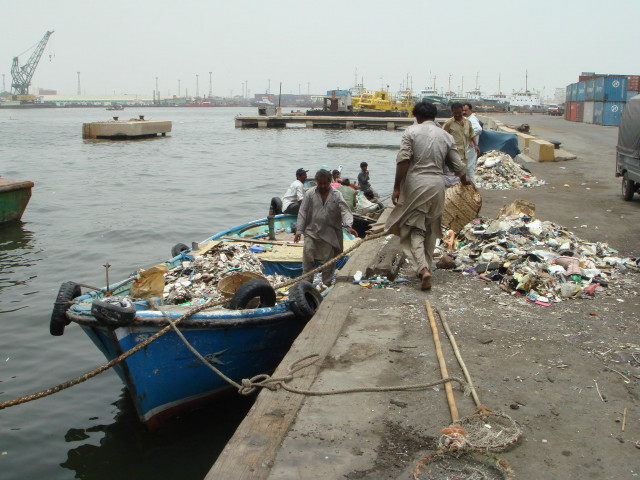'The ocean has fallen ill'
Civil society launches educational tool providing facts and figures on importance of marine ecosystems

PHOTO: AFP
If this situation continues unabated, the ocean will be dead by 2048, they said.
During the launching ceremony of 'Ocean Atlas, 2017', an educational tool that provides facts and figures on the importance of marine ecosystems and the urgency of sustainable development goal 14, they demanded a comprehensive and integrated approach to sustainable development and a sustainable approach to the ocean.
"The ocean has fallen ill. There is dire need for its treatment," said Pakistan Fisherfolk Forum (PFF) Chairperson Muhammad Ali Shah, who was organiser of the event.
'Sindh - most vulnerable province to climate change'
The ocean covers more than two-thirds of the planet's surface, but it has been polluted because of manmade efforts, he said.
He was of the view that the state of many fisheries is drastic and commercialisation in fisheries has depleted fishing resources.
The excessive use of artificial fertilizer and manure in industrial farming has caused accelerated algae growth, he said
"Around 50% oxygen comes from the sea, which also absorbs 30% of the carbon dioxide we omit. The sea has a capacity to regulate these things and the situation will be out of control if we don't stop polluting it," he remarked.
"Due to marine pollution, the oceans are acidifying faster than ever," he feared.
Sindh agency seals 17 factories for violating environmental laws
The twelve brief lessons about the ocean were discussed in Ocean Atlas which has been published by Heinrich Bell Foundation, a German-based organization. It revolves around concepts such as, who owns the ocean, where does the future lie, living with the ocean and more.
Mome Saleem, programme officer of Heinrich Bell Foundation, not only focused on garbage dump and industrial waste being thrown in the sea and its impact on the ecosystem, but said that bits of plastic floating in the ocean are only a visible sign of a much larger problem.
"The world produces 300 million tonnes of plastic each year. Around 2% of its (around eight million) metric tonnes ends up in the ocean," she said, adding that only 0.5% of plastic waste actually winds up in the garbage patches.
Rise in squid population recorded along the coast
"The lion's share of the plastic that ends up in the ocean lies hidden on the seafloor," she said.
Oil and other kinds of pollution have not only distributed the fish stock, but also depleted mangroves forests, which play a role as hatcheries for fishing.
The ocean gives us so much and our lives and livelihood depend on it, therefore we want to benefit from its gifts in future, she said.
"We must change our behaviour and this is the only reason to act," she said. "Due to excessive commercialisation in fishing, many species including the turtle and dolphins are going extinct and it will take years to recover them," she said.
Climate change: Metallic pollution in sea on the rise
The participants expressed dismay over industrial effluent being disposed of in the sea without treatment and demanded the government to install treatment plants.
PPP Senator Kareem Khawaja referred to the Senate Standing Committee meeting and said that a committee has been formed to visit Malir and Lyari River wherefrom the untreated water is disposed off in the sea.
"We have come to a consensus to install a treatment plant on the mount of both the rivers so that treated water can be released in the sea," he said adding that the committee will visit Karachi soon in order to consult with various stakeholders on this issue.



















COMMENTS
Comments are moderated and generally will be posted if they are on-topic and not abusive.
For more information, please see our Comments FAQ